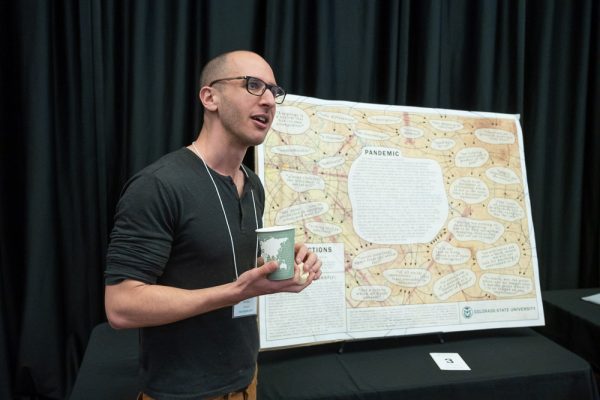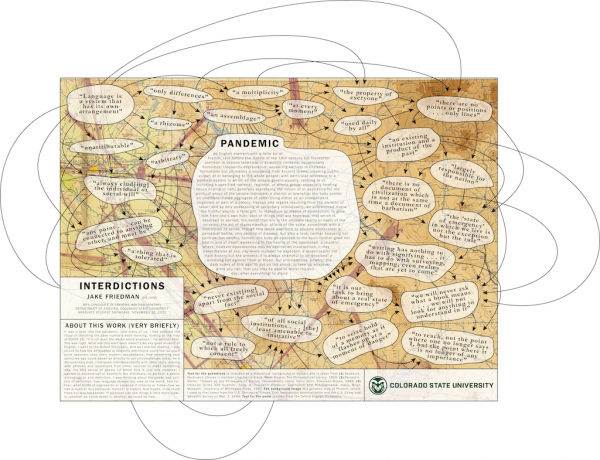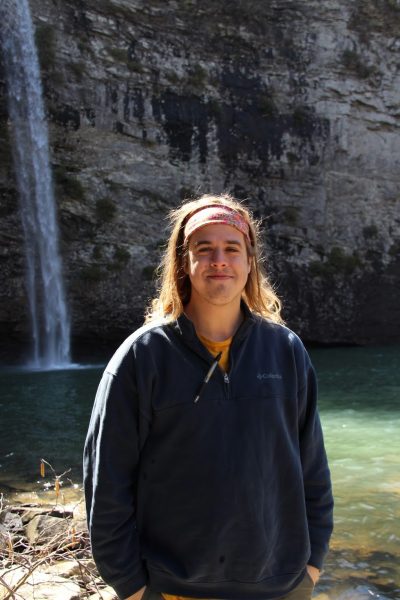
Held annually in the fall at the Lory Student Center, the Graduate Student Showcase is both an excellent opportunity for graduate students to gain conference experience (and confidence), as well as compete for more than $20,000 in scholarships while showcasing their research and creativity.
Consisting of live musical performances, creative writing readings, and poster presentations, the all-day conference culminates in an awards reception and keynote address.
This November, graduate students in the Department of English’s MFA program in Creative Writing – Jake Friedman, C Culbertson, and Chase Cate – swept the Distinction in Creativity honors awarded by the Graduate School and Office of Vice President for Research.
Friedman, a second-year MFA candidate in poetry, won first place for his presentation on the deconstruction and consequent poetic recovery of one word – pandemic.
In his artist statement, Friedman spoke about the origin of his project:
“It was a year into the pandemic. I had adopted the ritual of checking the case numbers each morning, looking at the map for COVID-19. ‘It’s not even the whole world anymore,’ my partner said. She was right. What did this word even mean? Like any good student of English, I went to the Oxford Dictionary. And as I started reading, I was struck by how the antiquated definitions could feel so much more resonant than their descendants, how something said centuries ago could so directly address our circumstances today.”
Inspired by the work of linguist Ferdinand Saussure, philosopher Jacques Derrida, and poet Anne Carson, Friedman began to consider the “inherent power and politics of definition, how language shapes the way we view the world.”
As a documentary poet, Friedman explained that his work plays interdependently with other texts and often begins by borrowing quotations from other sources and rearranging phrases to construct something new.
For a poem that would center the word pandemic, Friedman aimed to “deconstruct or backform the dictionary—to perform a poetic archeology or anti-definition.”
In his visual presentation, Friedman decided to remap and reclaim the definition as something new, collaborative, and ultimately more indicative of our current environment—messy.
“I wanted to make what the philosophers Gilles Deleuze and Felix Guattari would describe as a rhizome—a horizontal network, an unruly mass of roots, that disrupts hierarchy or authoritarian meaning,” Friedman said. “I wanted to reckon with the weight of language—to name the violence and oppression it inherits or hides—and whether we might be able to resist it, whether we could get ourselves free.”
The resulting, winning poem looks like this:
Pandemic
an English element with a little bit of French; rare before the middle of the 19th century but thereafter common in various technical or scientific contexts; occasionally humorous; frequently depreciative; appearing earliest in Christian formations but ultimately a borrowing from Ancient Greek; meaning public, vulgar, of or belonging to the whole people; with particular reference to a political system in which all the people govern equally; relating to or including a specified national, regional, or ethnic group; especially forming nouns ending in -ism; a district or township; the body politic; generally expressing an aspiration for union; an undifferentiated aggregate of cells; living either as an independent organism or part of a colony; tissues and organs resulting from the division of labor; and so only possessing of secondary individuality; an unbranched Hydra; a fatal gift; the fruitful wound; to reproduce by means of destruction; to grow rich from one’s own hurt; often said of things that are hopeless; that which is deserved or earned; the belief that will is the ultimate reality or basis of the universe; affairs of the state; sometimes with a distinction of sense; though this tends over time to become obliterated; a perpetual battle; only second of disease; but also a love; neither heavenly nor spiritual but human and earthly; the body as opposed to the soul; neither good nor bad in and of itself; depending entirely on the way it’s performed; a country where, however appearances may be against an insurrection, it may nevertheless at any, nay every moment be expected; awakening in the hearts of the oppressed; a wrestling not against flesh or blood, but principalities, powers, the dark rulers of this age; a lesson learnt not from history but the present; to put on the armor; to take up whatever arms you can; that you may be able to resist the evil day; after everything; to stand

On presenting at the GradShow, Friedman expressed conflicting emotions.
While on the one hand, he felt uneasy about stepping into a position of authority and attention, he ultimately wanted to elevate and showcase the value of the arts—and have his work reflect the rigorous academic research that is not always associated with the creative arts.
“Often the work we do [as poets] is seen as entertainment, perhaps, or merely personal, rather than being a technology of thought and perception, rather than being critical, or seen as something scholarly,” he said. “I wanted my project to help change this.”
Additionally, third-year MFA candidate in poetry C Culbertson was awarded second place while first-year poet Chase Cate won honorable mention.

For Cate, the GradShow provided them with the opportunity to give their first public reading – ever.
Cate read from a series of poems entitled “First Principles.” Through the exploration of memory, the project meditates on how trauma permeates through time, space, and the body. Primarily, Cate said the work reflects upon conservative religious constructions and masculinity.
While Cate was glad to have participated and grateful for the space to complete their first reading, they noted that the GradShow wasn’t without its challenges. Since the readings took place in the same ballroom as the ongoing poster presentations, Cate described the environment for the poetry readings as chaotic. They would like to see the readings presented in a separate space in the future.
To learn more about this year’s GradShow and browse the complete list of award winners, visit SOURCE here: https://source.colostate.edu/gradshow-2022-celebrates-presenters-with-over-19k-in-awards/